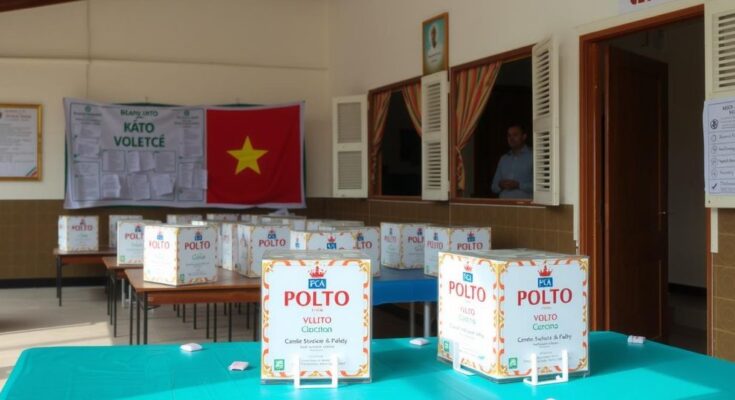Voters in Comoros are electing a 33-seat parliament amid contentious political conditions, with allegations of electoral irregularities surrounding President Assoumani’s administration. A divided opposition has emerged, leading to calls for a boycott, while others believe participating in the elections will expose governmental flaws. Results of the elections are expected by Friday.
Voters in Comoros are participating in parliamentary elections to fill the 33 seats in the country’s legislature, one year following the contentious re-election of President Azali Assoumani. Allegations of electoral irregularities were raised by the opposition, which the ruling party representatives have refuted. Polling opened early on Sunday for approximately 338,000 registered voters, with nearly 100 candidates selected by the Supreme Court to contest seats in the parliament, previously last elected in January 2020.
The political landscape is turbulent, with Assoumani’s opponents accusing him of authoritarianism and suggesting that he is positioning his eldest son, Nour El-Fath, for succession upon the conclusion of his term in 2029. President Assoumani has held power since 1999 following a coup and has successfully secured three electoral victories. Recently, sweeping new powers were conferred upon his son, enabling him to oversee all governmental affairs as of 2024.
The opposition remains divided; some parties, including Juwa, led by former President Ahmed Abdallah Sambi, who was convicted and sentenced to life in 2022, have advocated for a boycott of the elections, while others contest that decision. Hamidou Karihila of the opposition Hope of the Comoros party stated, “The Azali regime is weakened … by participating in these elections we are contributing to further exposing the flaws in its system and accelerating its inevitable fall.” The results of the election are anticipated by Friday.
The parliamentary elections in Comoros represent a significant moment in the political development of the nation, coming on the heels of a controversial election cycle that has prompted scrutiny regarding President Azali Assoumani’s adherence to democratic principles. His extended rule has stirred concerns regarding the integrity of governance and succession plans, particularly in light of the rising influence of his son. The societal implications of the election outcomes will be crucial in shaping both governance and political discourse in Comoros going forward.
The elections in Comoros highlight the ongoing political tensions within the nation, marked by allegations of authoritarianism under President Assoumani’s rule and his family’s growing political influence. With a split opposition stance on participation, the process aims to reveal the true sentiments of the electorate regarding the current political administration. The results, expected by Friday, will likely elucidate the future trajectory of Comoros’ governance and political stability.
Original Source: www.areanews.com.au




